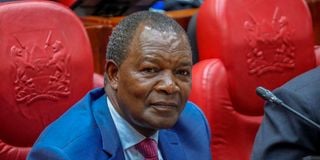Treasury in special audit to weed out duplication in State firms

National Treasury Cabinet Secretary Njuguna Ndung’u during a past appearance in Parliament.
The Treasury has lined up a special audit of all State corporations targeted at curbing duplicity of functions to ease the financial burden on the taxpayer.
A brief says the exercise will dig into the economic relevance of each parastatal and the actual contingent exposure to the national exchequer.
“Whereas the Public Finance Management Act (2012) and State Corporations Act (Cap. 446) make provision for adequate consultation prior to the establishment of State Corporations, this has not been adhered to resulting in the proliferation of State corporations,” Treasury Principal Secretary Chris Kiptoo said.
“This has led to duplication of functions or mandates becoming either obsolete, irrelevant, or unviable hence becoming a financial burden to the National Exchequer. Further, State corporations have over the years not performed as expected and the government has taken various reform interventions aimed at aligning State corporations to emerging national needs and priorities to enhance efficiencies in service delivery,” he added.
The government has zeroed in on mergers, a system for real-time monitoring, review of terms and conditions for boards, and new classification of entities in streamlining operations of struggling State-owned enterprises (SOEs) in line with the agreements arrived at with the multilateral lenders.
The World Bank in July revealed that the merger of SOEs will be focused on those, which are in the agriculture, industry, and finance sectors.
According to the latest data from the Treasury, Kenya has 18 SOEs in the financial sector and 28 in the manufacturing and industry.
Entities focused on agriculture are spread across the regulatory and tertiary institutions.
“The government is pursuing institutional reforms to mitigate these risks, including mergers of SOEs in different sectors (agriculture, industry, and finance); developing a Management Information System for the National Treasury and Economic Planning to help strengthen its capacity to monitor and analyse SOEs’ financial and operational performance; a review of the terms and conditions of SOE Boards; and a more granular classification of SOEs for more effective and differentiated oversight,” the World Bank indicates.
Kenya has about 354 State corporations and other public entities, many of which face financial challenges and pose contingent liability risks for the government.
On June 21, 2023, the Auditor General raised grave concerns regarding debt guaranteed by the taxpayer on behalf of SOEs that now stand at Sh145.4 billion.
“There is non-disclosure of all obligations guaranteed by the national government. Notably, loans guaranteed by the national government on Kenya Airways (Sh88.3 billion), KenGen (Sh24.5 billion), Kenya Power (Sh9.9 billion), and Kenya Ports Authority (Sh33.5 billion) were not reported in the financial year 2022.
There are non-performing loans where recipients have defaulted on payment obligations. As of June 30th, 2022, the portfolio of non-performing loans was Sh218.8 billion,” the Office of the Auditor General states.
The government is proposing to sell 11 parastatals with an asset value of more than Sh200 billion as part of the International Monetary Fund-backed reforms aimed at restructuring public entities and lessening reliance on taxpayers.
Stable entities lined up for privatisation — either through an initial public offering (IPO) or sale to a strategic investor — including Kenya Pipeline Company and Kenyatta International Convention Centre, book publisher, printer, and distributor Kenya Literature Bureau and New Kenya Cooperative Creameries Ltd.
Others are Kenya Seed Company, the National Oil Corporation of Kenya, Rivatex East Africa Ltd, Numerical Machining Complex Ltd, Kenya Vehicle Manufacturers Ltd, Mwea Rice Mills, and Western Kenya Rice Mills.





